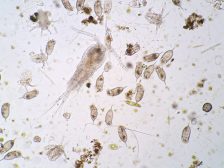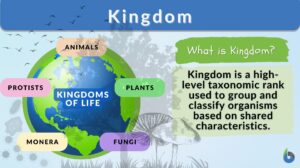Search Results for: microscopic
Microscopic
Microscopic 1. Of extremely small size, visible only by the aid of the microscope. 2. Pertaining or relating to a microscope... Read More
Microscopic section
microscopic section --> section 1. The act of cutting, or separation by cutting; as, the section of bodies. 2. A part... Read More
Microscopic anatomy
microscopic anatomy The branch of anatomy in which the structure of cells, tissues, and organs is studied with the light... Read More
Branches of biology
What is a Branch of Biology? A branch of biology is a specialized field or a sub-discipline in a much broader field of... Read More
Freshwater Communities & Plankton
Plankton are microscopic organisms that live suspended in the water environment and form a very important part of the... Read More
Biodiversity
The biological world or life on earth is a marvel that has amazed us since time immemorial. The rich natural diversity of... Read More
Microalgae
Microalgae Definition Microalgae (singular: microalga) are microscopic algal species as opposed to other algae that are... Read More
Primary productivity
Planet Earth is home to different types of life forms ranging from microscopic bacteria to giant whales and elephants. To... Read More
Osmotrophy
Definition noun The process of taking in of dissolved organic compounds that are absorbed into the cells via extracellular... Read More
Sporophyte
Sporophyte Definition What is a sporophyte? Accordingly, the sporophyte is the plant generation that produces spores. To... Read More
Neutral dye
Definition noun, plural: neutral dyes (biological techniques) A compound of an acid dye and a basic dye used in staining... Read More
Interphase
Interphase is the critical period in the eukaryotic cell cycle characterized by a sequence of events like the G1 phase where... Read More
Glaucophyte
Definition noun, plural: glaucophytes Any of the freshwater microscopic algae of the Kingdom... Read More
Lotic Communities & Animals
A running water environment offers numerous microhabitats that simulate favorable conditions for many types of animals to... Read More
Microorganism
Definition noun, plural: microorganisms An organism that is microscopic or submicroscopic, which means it is too small to... Read More
Plant cell
Plant Cell Definition A plant cell refers to any cell of a plant. It is the structural and functional unit of plants. Plant... Read More
Malpighian layer
Definition noun The lower layer of epidermis consisting of non-keratinized, viable cells, in contrast to the outer (upper)... Read More
Classification system
Classification Systems Definition In life, many things are classified, that is, to put into categories or groups based on... Read More
Genetic Engineering Advantages & Disadvantages
Through genetic engineering, scientists are able to move desirable genes from one plant or animal to another or... Read More
Muscular system
Muscular System Definition What is the muscular system? The muscular system is a system that includes muscle cells and... Read More
Anaerobic respiration
Anaerobic Respiration Definition What is anaerobic respiration? Anaerobic (cellular) respiration is a respiratory process... Read More
Plasmodesmata
Plasmodesmata (singular, plasmodesma) microscopic channels of plants facilitating transport and communication between... Read More
The interstitium – a new biological organ?
Scientists found, apparently by accident, a new biological organ and they want it called "interstitium". The discovery was... Read More
Diatomaceous earth
Definition noun A type of silica-rich dirt which is soft, fine-grained, porous, light-coloured, and composed of the... Read More
Hyaline cartilage
Hyaline Cartilage Definition Before we define hyaline cartilage, let us understand what cartilage is. What is cartilage? Is... Read More
A Protein Being Born – a live cell imaging of RNA translation
You probably already heard the concepts of translation in the central dogma of molecular biology. The dogma is an... Read More
Decomposer
Decomposer Definition The organisms that carry out the process of decay or breakdown of the dead organism are known as... Read More
Trophic level
In ecology, a trophic level pertains to a position in a food chain or ecological pyramid occupied by a group of organisms... Read More
Arthropods
There are over two million species of arthropods, who initially arrived on Earth in the middle of the Cambrian period.... Read More
Mass extinction
Definition noun The extinction of one of more species in a relatively short period of geological time, usually as a... Read More




























